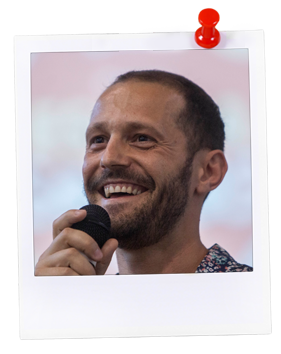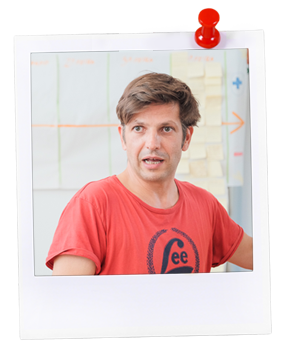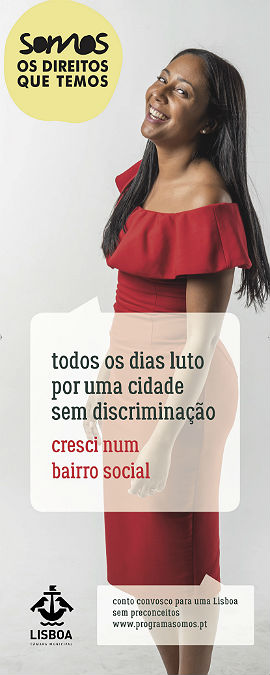SOMOS Lisbon Programme for Democratic Citizenship and Human Rights Education
by Sérgio Xavier
with the collaboration of Daniel Oliveira
30/11/2017

"Trainers pool" by Américo Tavares Simas Coelho /CMLisboa
by Sérgio Xavier
with the collaboration of Daniel Oliveira
30/11/2017
SOMOS is an innovative local programme of education for democratic citizenship and human rights. It was prepared from scratch over one year and launched in Lisbon on 10 December 2015, costing €100 000. It aims to develop a shared culture of human rights and democracy in the city through training and awareness-raising initiatives.
SOMOS should not be considered a project – SOMOS is a programme: it does not have a defined duration and it provides a continuous response at local level (e.g. EDC/HRE workshops); it contains different projects within it (e.g. trainings, defined duration “EDC/HRE schools” or campaigns); and it involves a continuous effort in adjusting the structural responses to the needs identified in the city, including developing specific projects each year (e.g. an EDC/HRE school targeting professors).
SOMOS aims to develop a culture of human rights and democratic citizenship in Lisbon. From the city council staff to a wide scope of target groups in the city, it provides training for free, in 23 available themes, involving a broad diversity of partner organisations and institutions. It grants intensive training to multipliers in the city, which contribute to the general goal of directly reaching at least 2 000 people per year. It also promotes awareness-raising campaigns tackling human rights in general and discrimination specifically, thereby fostering social reflection and debate.
SOMOS is run by the municipality of Lisbon.

© Picture of III SOMOS SCHOOL" by João Henriques / Bagabaga Studios
In the 2013 local elections, the majority of voters supported the Lisbon City Governmental Programme 2013-20171 which encompassed the intentions to promote “effective access to social rights” and the “elimination of the causes of exclusion and discrimination”.2 SOMOS – the Lisbon Programme for Democratic Citizenship and Human Rights Education – is a wide framework designed to respond to these political intentions and is anchored in the needs of the people living in the city.
Furthermore, SOMOS is a reaction to such worrying data as the Eurobarometer on discrimination in the EU in 2015, concluding that only 42% of Portuguese people have knowledge of their rights, only 18% state that the efforts made to combat discrimination are effective and only 15% think that there’s no need to introduce new measures of protection from discrimination.3 SOMOS follows international guidelines such as the ones from the Council of Europe urging for the promotion of local4 and national policies on education for democratic citizenship and human rights education (EDC/HRE).5 All in all, the programme starts from the principle that human rights education is a human right.6
The process of conceiving a broad programme such as SOMOS involved decision makers and officers working together effectively in order to develop a common ground of intentions. At an initial stage, four priorities were established:


Daniel works for the Lisbon City Council in the field of adult education.
The SOMOS programme can be understood in two ways: training and awareness-raising activities. Training is provided for the city council staff in the initial strategic learning processes aiming to increase internal coherence of practices – a Training of Trainers on Social Rights Education and a Training of Facilitators of Consultative Processes. Training is also addressed to external publics, aiming to develop the compound effects of SOMOS values. The awareness-raising activities include small workshops – from three to seven hours of experiential learning – focused on any of the more than the 20 standard themes. The workshops are provided for free to the groups, organisations and institutions who request them, whether they’re private, public, governmental, non-governmental, formal, informal, corporate or educational. Anyone can benefit from SOMOS workshops, which are co-managed by the partner NGO, Rede Inducar.
SOMOS widely disseminates the branding SOMOS os Direitos que Temos (We are the rights we have), promoting self-responsibility in assuring one’s own rights and the rights of others. One of the two awareness-raising campaigns is named after the branding and in life-size posters across the city features young people coming out with short anti-discrimination statements. The objective is to deconstruct a variety of stereotypes and prejudices among the population.
The campaign Os Direitos estão nas nossas Mãos (Human rights are in our hands) disseminates throughout the city a monthly poster tackling different themes. It raises awareness about everyone’s role in promoting and protecting each other’s rights.

© Pedro Almeida | LIGARTE atelier
Escola SOMOS (SOMOS School) is one of the most visible activities in the programme. It consists of an intensive week of parallel training courses on human rights and democratic citizenship themes, where about 70 participants engage together in educational activities. SOMOS Schools are built with partner organisations, including migrants’ NGOs, and take place once or twice a year, gathering people from distinct sectors such as NGOs, academies, public institutions, corporate bodies, schools, volunteers, etc. Besides the training and networking dimension, SOMOS Schools host activities which are open to the wider public such as cinema sessions, human rights and democracy organisational practices or living libraries.8
All the educational activities in SOMOS happen under non-formal education. SOMOS themes include: rights of the child, racism, LGBTi rights, disability, gender violence and bullying.
Being a transversal programme, SOMOS is not targeting any particular group. Nevertheless, given the importance of EDC/HRE in working with young people, strategic partnerships with youth organisations have been set up, both with institutions and NGOs. A number of the workshops implemented for free are requested by youth organisations or participated in by young people and/or youth workers. This is also the case with the training included in SOMOS Schools where organisations working with young people are key partners, with ownership over the training programmes. The participation in SOMOS Schools is also free and the training is formally certificated, being a much appreciated feature by the participants.
I promote the inclusion of all gender identities every day
I am a transsexual woman

I learn continuously from people who are different than me
Racism is the result of ignorance

Every day I fight for a city without discrimination
I grew up in a social housing neighbourhood
© "Awareness campaign" by Américo Tavares Simas Coelho / CMLisboa
SOMOS has the capacity to articulate and implement a wide plan on social rights in the city of Lisbon; it directly puts in place strategic actions related to human rights education, but it also excels in supporting parallel processes, namely consultative processes. The SOMOS pool of multipliers has often been called in to facilitate participatory stages in structural projects such as the Fórum da Cidadania (Citizenship Forum).9 Consequently, the city now has a new reliable resource, a pool of facilitators, ready to work professionally.
The SOMOS os Direitos que Temos campaign is an example of its connection with parallel rights policies such as the Municipal Plan for Refugee Hosting, the City Plan for Homeless People, the Gender Equality agenda, the LGBTI rights agenda, the Interculturality and Migrants agenda, the Independent Life agenda, etc. By displaying awareness-raising messages from the victims of discrimination, all the parallel rights policies end up benefiting.
The 90 SOMOS awareness-raising workshops implemented so far demonstrate the interest from the different actors in the city for the 23 themes proposed by the programme. A majority of the requests relate to anti-discrimination and prevention of violence (such as bullying), contributing to a more inclusive environment in each specific context. The transversal, inclusive approach of SOMOS in training and consultative processes fosters social cohesion and contributes to quality local practices. The SOMOS pool of multipliers is composed of 41 people connected with a diversity of organisations. This creates a standard of everyone-learns-from-everyone, making the community pool of practices sustainable. SOMOS has ended up being a continuous partnership with 32 organisations.
The two initial training courses addressing Lisbon City Council trainers broadened the “learningscape” and opportunities of the organisation. This has resulted in reliable multipliers who are now implementing human rights training courses throughout non-formal education in collaboration with organisations that were previously almost absent from their professional lives. The three SOMOS Schools (encompassing 13 training courses) promoted so far have paved the way for the participants of the earlier versions of the courses to act as trainers for the later ones. The 34 internal training courses have involved 304 participants in different themes. In total, SOMOS has reached 1 907 people so far.
SOMOS introduced change and space for change to take place within the city council. This is especially relevant because while on the one hand the internal practices are considered to be reliable, on the other, practices can also be highly rigid. The possibilities of shared responsibility with players and workers who are not part of the establishment are often compromised – difference and innovation can therefore be blocked.
The collaboration process is starting to show this long-standing impact. It is becoming more and more clear for all stakeholders – city council, NGOs, individuals – that the responsibilities of the municipality in many fields stand in the way of developing projects with the community, while also breaking the objective of providing projects for the community.SOMOS’s most significant challenge was its design, given the fact that there was no similar example at local level from which to take inspiration. It took about a year to design the programme, in discussions with different stakeholders from within and external to the city council. SOMOS is under constant evaluation and improvement.
SOMOS’s pedagogical style is not mainstreamed in public policies and its main results reflect intangible learning outcomes. These facts are challenging in making the programme understandable and communicable. Nevertheless, efficient – tangible – communication was essential in order for it to be regarded as a political priority.
Another challenge relates to the gathering of the different human resources and services needed to make SOMOS work. Intertwining different practices and departmental needs is an ongoing process requiring regular co-ordination efforts. It is important to identify what can be done and what cannot be done by the city council services in order to identify partners for the co-management of the programme.
The sustainability of the programme depends on the will being maintained in political cycles but also on the coherence of its implementation and co-ordination. A human rights education programme can’t afford to fail on its conceptual and advocacy coherence. This can be challenging in a large institution such as the Lisbon City Council. It’s important to ensure that the demanding tasks fall into the hands of people with the know-how to handle them, while also fostering constant learning opportunities for city council staff without compromising the quality of the activities. The biggest challenge for the future of a programme such as SOMOS may be saving it from a decline in quality, in particular regarding its non-formal education approach.

© "Picture of II SOMOS SCHOOL" by Ricardo Rodrigues da Silva / Amnistia Internacional
Significant lessons have been learned with SOMOS. It shows that it is possible for a city council to provide coherent human rights education and education for democracy. This was one of the statements of the Secretary of State of Education, João Costa, during the closing session of the III SOMOS School, while suggesting that the programme is inspirational at national level. With a budget as small as €100 000 (0.01% of the total budget for the city council), SOMOS directly impacts about 2 000 people per year (of which at least 450 are young people benefiting from awareness-raising workshops) and develops a shared culture of human rights and democratic citizenship in Lisbon.
SOMOS also reflects the importance of pursuing an intersectorial approach. Co-operation with NGOs, academies, schools or corporate bodies is essential for the cohesion and horizontality of the programme. Co-management is a solution for complicated tasks, and bottom-up processes for designing initiatives is an important feature.
SOMOS, with its pool of multipliers, not only proves to be a resource that people in the city can easily reach, it also proves to be a resource to the city council, namely in the field of internal training and facilitation of participatory initiatives.
A number of municipalities have shown interest in adopting SOMOS. A careful understanding of the context and the city council specificities is needed in order to transfer the programme. Appropriate human resources are crucial for the design, co-ordination and implementation of a transferred SOMOS.
Moreover, apart from its adoption in other cities both within and beyond the country, SOMOS can also have an important role in contributing to the monitoring of the implementation of the Council of Europe Charter on Education for Democratic Citizenship and Human Rights Education in Portugal.
1. Municipality of Lisbon, 2013.
2. Municipality of Lisbon, 2013, p. 49.
3. European Comission, 2015, pp. 3-4.
4. Have Your Say! - MANUAL on the Revised European Charter on the Participation of Young People in Local and Regional Life, 2008, p. 7.
5. Council of Europe Charter on Education for Democratic Citizenship and Human Rights Education, 2010, p. 8. Compass – Manual for human rights education with young people, 2012, p. 484.
6. United Nations, 1948, Article 26, 2.
7. Municipality of Lisbon, 2015.
8. Little, Nemutlu, Magic and Molnár, 2011.
9. Municipality of Lisbon, 2017.
Bloom B., Engelhart M., Furst E., Hill W. and Krathwohl D. (1956), Taxonomy of educational objectives. Handbook I: the cognitive domain, David McKay Co., New York.
Council of Europe (2008), Have Your Say! Manual on the revised European Charter on the Participation of Young People in Local and Regional Life, Council of Europe, Strasbourg, https://tinyurl.com/yazeryts.
Council of Europe (2010), Council of Europe Charter on Education for Democratic Citizenship and Human Rights Education, Council of Europe,Strasbourg, https://rm.coe.int/16803034e5.
Council of Europe (2012), Compass – Manual for human rights education with young people, Council of Europe, Strasbourg, www.coe.int/en/web/compass.
European Commission (2015), Eurobarometer – Discrimination in the EU in 2015, Portugal Factsheet, European Commission, Brussels, http://ec.europa.eu/commfrontoffice/publicopinion/index.cfm/ResultDoc/download/DocumentKy/68087.
Kolb D. A. (1984), Experiential learning: experience as the source of learning and development (Vol. 1), Prentice-Hall, Englewood Cliffs, NJ.
Little N., Nemutlu G., Magic J. and Molnár B. (2011), Don’t judge a book by its cover! The Living Library organiser’s guide 2011. Council of Europe, Youth Department, Budapest, https://rm.coe.int/16807023dd.
Municipality of Lisbon (2013), Programa de Governo da Cidade de Lisboa 2013-2017, Municipality of Lisbon, Lisbon, https://tinyurl.com/yc2vpbfv.
Municipality of Lisbon (2014), Plano de Acção dos Direitos Sociais 2014-2017, Municipality of Lisbon, Lisbon, http://lisboasolidaria.cm-lisboa.pt/documentos/1422547210W1vZN0ou3Wu74CY0.pdf.
Municipality of Lisbon (2015), SOMOS – Programa Municipal de Educação para a Cidadania Democrática e Direitos Humanos. Municipality of Lisbon, Lisbon, http://docs.wixstatic.com/ugd/42455b_720245ad55ae47e193dfeddc776ca5bb.pdf.
Municipality of Lisbon (2017, 07 13). Fórum da Cidadania, Câmara Municipal de Lisboa, www.cm-lisboa.pt/forum-da-cidadania/4o-forum-da-cidadania.
United Nations (1948), Universal Declaration of Human Rights, United Nations, New York
http://www.un.org/en/universal-declaration-human-rights/
Do you have comments on the article?
Use the Feedback form to give your comments and/or visit our Facebook page!
Partnership between the European Commission and the Council of Europe in the field of youth
c/o Council of Europe / Directorate of Democratic Citizenship and Participation Youth Department / F-67075 Strasbourg Cedex, France
c/o Council of Europe / Brussels office / Avenue des Nerviens 85 / B-1040 Brussels / Belgium